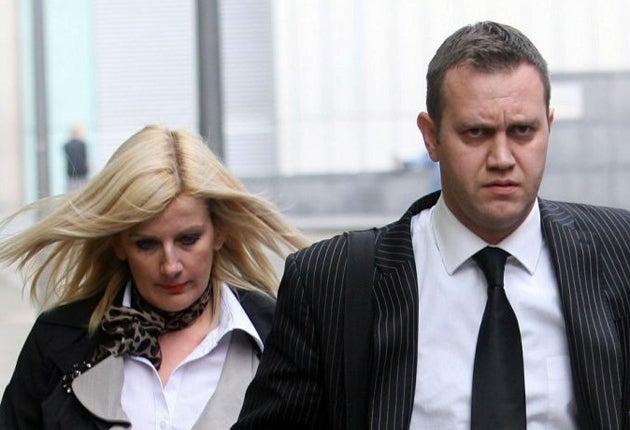A right royal fraud: The £3m scam that fooled Palace police
Ex-protection officer had death threats after taking millions from colleagues, their families, and friends

It is a tale of greed, fraud, irresponsible lending and poor regulation. Only the background to the story is not the City, but Buckingham Palace. The fat-cattery did not feature corporate executives, but centred on the policemen and -women who guard the Queen and the rest of the Royal Family.
What started as a get-rich-quick scheme in the late 1990s spiralled out of control, ending in the loss of multimillion fortunes, allegations of steroids dealing, porn, drunkenness on duty – and even death threats.
At its heart was former royal protection officer Paul Page, who on Friday was convicted of a £3m fraud. The losers, according to the story that unfolded at Southwark Crown Court in south London, are not overstretched buy-to-let types but Page's own royal protection colleagues, their families and friends. Add to this, light-touch regulation by the Metropolitan Police's secretive Royalty Protection Command (SO14) and anti-corruption squad together with allegations of Prince Andrew's assignations with attractive female companions.
The court heard that Page was drawn to the world of share dealing after his arrival at Buckingham Palace in June 1998. As an amateur trader he made money during the dotcom bubble and took a financial bath when it burst. Undeterred, he started the Currency Club at Buckingham Palace in 2001, which involved spread betting on the financial markets and gambling on big sporting events.
The monthly cash returns on investments of £5,000 to £10,000 attracted officers from other palaces and other Met police squads. The jury heard unchallenged evidence from Page that in late 2002 senior royal protection officers told him the Currency Club was "sticking out like a sore thumb" and should be taken "away from the Palace".
He went on extended special leave and folded the Currency Club into a new firm, United Land & Property Development (ULPD), in early 2003. He told the jury it was essentially a front for a pyramid scheme fuelled by spread betting and gambling on football matches, horse racing and even guessing the winner of Big Brother.
Page said an Essex barn conversion project was a "fallback" in case the syndicate of police and civilian investors sustained heavy losses.
But prosecutor Douglas Day QC said ULPD was, from the start, a fraudulent vehicle designed to deceive people into thinking they were investing in property when in fact Page was using their money to fund his growing gambling addiction. None of his investors, he said, saw the heavy betting losses Page incurred.
At least 20 SO14 officers lost an estimated total of £1.36m in Page's scheme. Every police and civilian prosecution witness gave similar evidence that their investment with Page was only to be used for property developments and never spread betting. Yet most of them never visited any of the property sites before investing, in some cases, their life savings. Most took no financial or legal advice nor placed a charge on the property development.
None, apparently, questioned how Page could regularly pay out cash returns when its property developments were not even ready for sale.
Remarkably, the court heard of the willingness of police officers to take brown envelopes of cash or transfer large sums of money into the bank accounts of complete strangers.
SO14 prosecution witnesses told the court that they trusted Page because he was a fellow police officer.
By Christmas 2005, the court heard, his financial empire was unravelling. Page's gambling losses topped £1m and his drinking spiralled out of control as his backers sought repayment.
The court was told that one wealthy investor allegedly attempted to hire a hit man to kill Page after realising his investment of more than £1m had vanished. The investor denied the allegation. Page, who was warned by police that there might be a threat to his life, was himself acquitted of making a threat to kill one of his financial victims.
Only in mid-2006 did senior officers at Scotland Yard wake up to the major scandal under the Queen's nose.
Page will be sentenced later this month. Scotland Yard said it would not investigate allegations of widespread ill-discipline and poor supervision of royal protection officers, including allegations of officers drunk or asleep on duty, or of officers dealing in pornography or steroids. A spokesman said the claims were "unsubstantiated".
